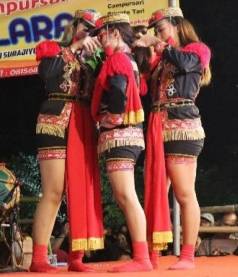Ndadi: A Preliminary Perspective on Trance in the Angguk Sripanglaras Folk Performance of Kulon Progo, Yogyakarta, Indonesia
Main Article Content
บทคัดย่อ
This study investigates the complexities of dancers' experiences during the ndadi moment in Angguk performances, an emblematic folk performance from Kulon Progo Regency in Yogyakarta. The full Angguk performance consists of three sequences, with ndadi scenes in each sequence. Researchers have often interpreted the Ndadi scene as a state of possession or trance, and this study tries to determine whether it is indeed possession or trance. For this study, Angguk Sripanglara's performances were observed, interviews were conducted with performers and leaders, and the relevant literature was reviewed. The results showed that dancers experienced diverse conditions during an Ndadi scene, and the experience could vary from performance to performance. Based on observation and interviews, ndadi is a mandatory part of a full Angguk performance, whether the dancers experience trance, possession, both, or neither.
Article Details

อนุญาตภายใต้เงื่อนไข Creative Commons Attribution-NonCommercial-NoDerivatives 4.0 International License.
เนื้อหาและข้อมูลที่ได้รับการเผยแพร่ในวารสารวิพิธพัฒนศิลป์ ถือเป็นข้อคิดเห็นและความรับผิดชอบของผู้แต่งเท่านั้น โดยกองบรรณาธิการวารสารไม่มีส่วนรับผิดชอบต่อเนื้อหาหรือข้อคิดเห็นใด ๆ ที่ปรากฏในบทความ
เอกสารอ้างอิง
Christensen, P. (2018). Modernity and Spirit Possession in Java. Horse Dance and Its Contested Magic. Dynamics of Religion in Southeast Asia, 91–110. https://doi.org/10.1515/9789048516278-006
Denaga Media. (2023, June 17). Live Streaming Angguk Putri Sripanglaras Pripih Formasi Baru 2023. YouTube. https://www.youtube.com/watch?v=uX2Qcnc1XqA
Endraswara, S. (2006). Metode, Teori, Teknik, Penelitian Kebudayaan: Ideologi, Epistemologi dan Aplikasi. Pustaka Widyatama.
Gombloh, J. S. (2002). Trance dalam Seni Pertunjukan Angguk Ndadi. Majalah Gong: Media, Seni Dan Pendidikan Seni No 32.
Hammons, C. S. (2013). Jathilan: Trance and Possession in Java. American Anthropologist, 115(3), 509–510. https://doi.org/10.1111/aman.12035
Merriam-Webster. (2024, July 10). https://www.merriam-webster.com/dictionary/trance
Moelong, L. J. (2006). Metode Penelitian Kualitatif edisi revisi (20th ed.). Remaja Rosdakarya Offset.
PKP Kulon progo. (2022, August 2). Perkim.id. PKP Kulon progo - perkim.id
Rabimin. (2000). Studi Tentang Gending-Gending Iringan Ndadi Angguk non Cerita Daerah Kabupaten Kebumen: Studi Kajian Tekstual dan 97 Muhammad Nur Salim: Ketertatikan Antara Sajian Gending Dan Proses Pencapaian Ndadi Pada Pertunjukan Jathilan Fungsi.
Rapoport, E. (2018). Jathilan Horse Dance: Spirit Possession Beliefs and Practices in The Present-Day Java. IKAT : The Indonesian Journal of Southeast Asian Studies, 2(1), https://doi.org/10.22146/ikat.v2i1.37389
Spradley, J. P. (1997). Metode Etnografi. Tiara Wacana.
Sugiyono. (2013). Metodelogi Penelitian Kuantitatif, Kualitatif Dan R&D. Alfabeta.
Suryati, S. (2013). Struktur Dan Estetika Angguk Putri “Sri Lestari” Di Dusun Pripih Kulon Progo. Promusika, 61–74. https://doi.org/10.24821/promusika.v0i0.540
Sutaryo. (1979). Kesenian Angguk di Desa Garongan (Sebuah Laporan Penelitian).
Groenendael, V., Victoria M. C., Yperen V., M. J. (2008). Jaranan: The Horse Dance and Trance in East Java. KITLV Press.


